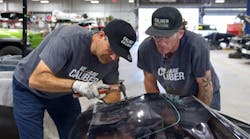If you’re not moving forward, you’re likely moving backward, as the saying goes. And there’s no better time than right now to check your direction and make some small adjustments if you’re not getting where you want to be. Although the tight credit market has made big investments impossible for most, there are plenty of small changes that can help you survive and even thrive during a downturn. We asked savvy shop operators and industry experts for tips and inspiration that have seen their companies through hard times. The result: 16 things you can do right now to energize your employees, wow your customers and get your business back on track.
FOCUS ON EMPLOYEES
Productive, satisfied employees are the key to any shop’s success. The recession has been rough for employees, who have seen friends, family members and sometimes even co-workers lose their jobs. Still, there are many things you can do to boost morale without spending a dime—and things that ensure the dime you do spend on employees is wisely invested.
#1 MINE YOUR EMPLOYEES
Ask your staff for ideas to improve efficiency, says Norm Rose, president of Excel Sales Consulting Inc. in Dewinton, Alberta. Getting input from employees and then implementing suggestions they have for improvement makes them feel valued.
This is particularly true when times are tough and morale might be at a low point. Pete Latuff, owner of Latuff Brothers Auto Body in St. Paul, Minn., got the inspiration to take his shop paperless in 2008 during an informal exchange of ideas with his son, who works in the shop. “A lot of times the best ideas come from the floor,” says Latuff.
#2 BE HONEST
It’s important to be straight with employees, even if you have to deliver bad news, says Darrell Amberson, president of Lehman’s Garage Inc. in Bloomington, Minn., and director of the Automotive Service Association collision division. Lehman’s Garage had to let 18 employees go last spring and now has 96 employees at six shops. “It’s very unsettling for the rest of the employees,” says Amberson of letting employees go. “We want to maintain the image of stability, so I try to be upbeat and positive while also being honest.”
#3 DO SOME GOOD
Create opportunities for employees to help others. It can be refreshing to take some action that benefits those in need. Employees at Lehman’s Garage volunteered to repair a donated car that would be given to a struggling family. Just before Christmas, Lehman’s presented the car to the recipient, who was referred by an organization that helps battered women. Amberson was amazed how much camaraderie the project generated among the employees: “They came in early and stayed late and worked without being punched in.”
#4 CREATE A SILVER LINING
If you’ve had to trim your workforce, give employees new opportunities based on the shifting workload, and emphasize how much more efficient they’ve become. That was one benefit to some of Amberson’s employees, after the layoffs. “We’ve seen a lot of improvement, and hats off to the employees for that,” he says. “We’re definitely more efficient than we were a year ago.”
#5 BE OPPORTUNISTIC
If you’re in the market for new workers, take advantage of dealership closures by picking up high quality employees. Gary Bell, co-owner of Northside Collision in Syracuse, N.Y., says his company hired several good employees who were let go when dealerships in the area shut down. “We’ve used this as an opportunity to get the right people in the right jobs,” says Bell, whose seven locations employ 125 people.
SMART INVESTMENTS GO A LONG WAY
Small investments that save time, make life easier for your employees and pay off in the short term go a long way toward beefing up morale—and your bottom line. It’s hard to make a case for investing during a down economy, but some small investments pay themselves off immediately in improved efficiency and other savings. Successful shop owners share their best low-cost, high-return strategies for making smart investments, even during a recession:
#6 SAVE THE TREES
Consider going paperless. Latuff made his paperless transformation, which is saving his shop upwards of $8,000 per year in paper, toner, labor and space efficiency by buying a couple of scanners that cost less than $200 apiece. The scanners paid themselves off quickly in materials savings. “Plus it’s really increased our efficiency,” Latuff says.
#7 BUY CHEAP
Take advantage of falling prices on other consumer electronics you can use around the shop, such as digital cameras for documenting repairs, or computer monitors. As part of his paperless campaign, Latuff outfitted each of his work stations with dual computer monitors that cost about $150 each so techs can scroll through files, stay informed about parts orders, and keep in touch with the front office—without having to leave their stations or cart around bulky paper files. That delivers return on investment in labor efficiency. “And it’s so much more convenient,” Latuff adds, which helps employee morale.
#8 TRIM CAREFULLY
Be mindful when making cuts. When times are tough, certain areas of the budget seem expendable, such as marketing. However, cutting your marketing budget can have an immediate and detrimental impact on your bottom line. Recalling a cautionary example that was often cited in last year’s down economy, Amberson says, “During the Depression, Ford reduced its advertising and Chevrolet increased theirs. By the end of the Depression, Chevrolet had taken market share away from Ford.” Amberson took the lesson to heart, and maintained his company’s annual marketing budget even while letting staff go.
#9 BE DISCIPLINED
Identify your break-even point, and stick to it, Amberson says. That might mean making difficult decisions, such as letting employees go. But it’s key to surviving and even growing during difficult times. “It’s important to behave more like businessmen than repairers,” Amberson says. “It’s easy to get caught up in the passion of repairing, and that technical aspect is important.” But, he says, you can’t lose sight of the fact that you’re running a business.
GET ON THE SALES BANDWAGON
Business is no longer just walking through the door with little or no salesmanship to make it happen. It’s important to accept that you may have to work in a new way to get business—and that means putting on that sales hat, says Al Strauss, founder of Westlake, Ohio-based Sales Concepts Inc., which counsels collision repair shops on salesmanship. In many industries today, “you might have to make twice as many calls to get the same level of business,” says Strauss. That’s not all bad, though. There’s opportunity in this economic landscape because some of your competitors might have given up on salesmanship. “That customer might be used to face-to-face contact, and they’re not getting that anymore,” Strauss says. That creates opportunity for a repairer who’s willing to hustle for the business, for example from an insurance company that’s starting to focus its attention on your geographical area. Here are a few tips to jump-start your salesmanship:
#10 GET SENSITIVE
Create an empathetic sales culture, Strauss says. Instead of talking about why customers should get their car fixed at your shop, ask them lots of questions about the event that brought them in. This is particularly important in collision repair. “They’re all distraught and upset. It’s a very emotional thing. Asking questions shows that you are genuinely concerned about them, and makes them more likely to trust you,” Strauss says. Once you have all the information they’ve given you through your interviewing process, it’ll be difficult for them to justify going elsewhere, because you’ve begun to develop a relationship.
#11 PROTECT YOUR TIME
Ask the important questions first. High up on the list of your questions should be what their insurance company’s policy is. “Some insurance companies are easy to deal with and some are difficult,” Strauss says. Before you spend an hour asking your potential customer questions, make sure you know their insurer. Make it your business to know the policies of the insurance companies that operate in your area, and stay informed about what’s going on at those companies.
#12 KEEP EMPLOYEES IN THE LOOP
Work together with your employees to decide on specific sales goals, says Rose. Employees respond better to goals they’ve been instrumental in helping set. “It builds morale and helps people embrace the idea that these are changing times, not just challenging times,” says Rose. “That’s an important distinction for employees.”
RELATIONSHIP MAINTENANCE
Strong relationships have kept Lehman’s Garage afloat during all the hard times it’s experienced in the 90-plus years it’s been in business, says Amberson. Nowadays, that means relationships with vendors, insurance companies and customers. Here are some simple steps to take in order to strengthen relationships during this critical time:
#13 BE IN THE KNOW
Stay on top of changes going on in other industries that affect collision repair, says Strauss. “People see their business has changed, and they think the economy’s the problem but it might be something else,” Strauss says. Other industries, such as insurance, are going through massive upheaval right now, and it’s important for repairers to stay on top of those changes so they can respond to them and talk knowledgeably with customers.
#14 ACCOMMODATE REALITY
Become flexible on pricing for customer pay jobs, a strategy that can keep customers loyal, Amberson says. “People are more inclined to shop around when the economy is tough,” Amberson says.
#15 REACH OUT
Cultivate relationships with other body shops. “A lot of people came to NACE this year feeling pretty down in the dumps, but talking to each other really made them feel reinvigorated,” Amberson says.
#16 PUT IT IN PERSPECTIVE
Remember that the collision repair industry has been through tough times in the past, has learned lessons and has gone on to thrive again, says Amberson. “We always adjust, and we can evolve. It’s important to take a long-term approach.”



